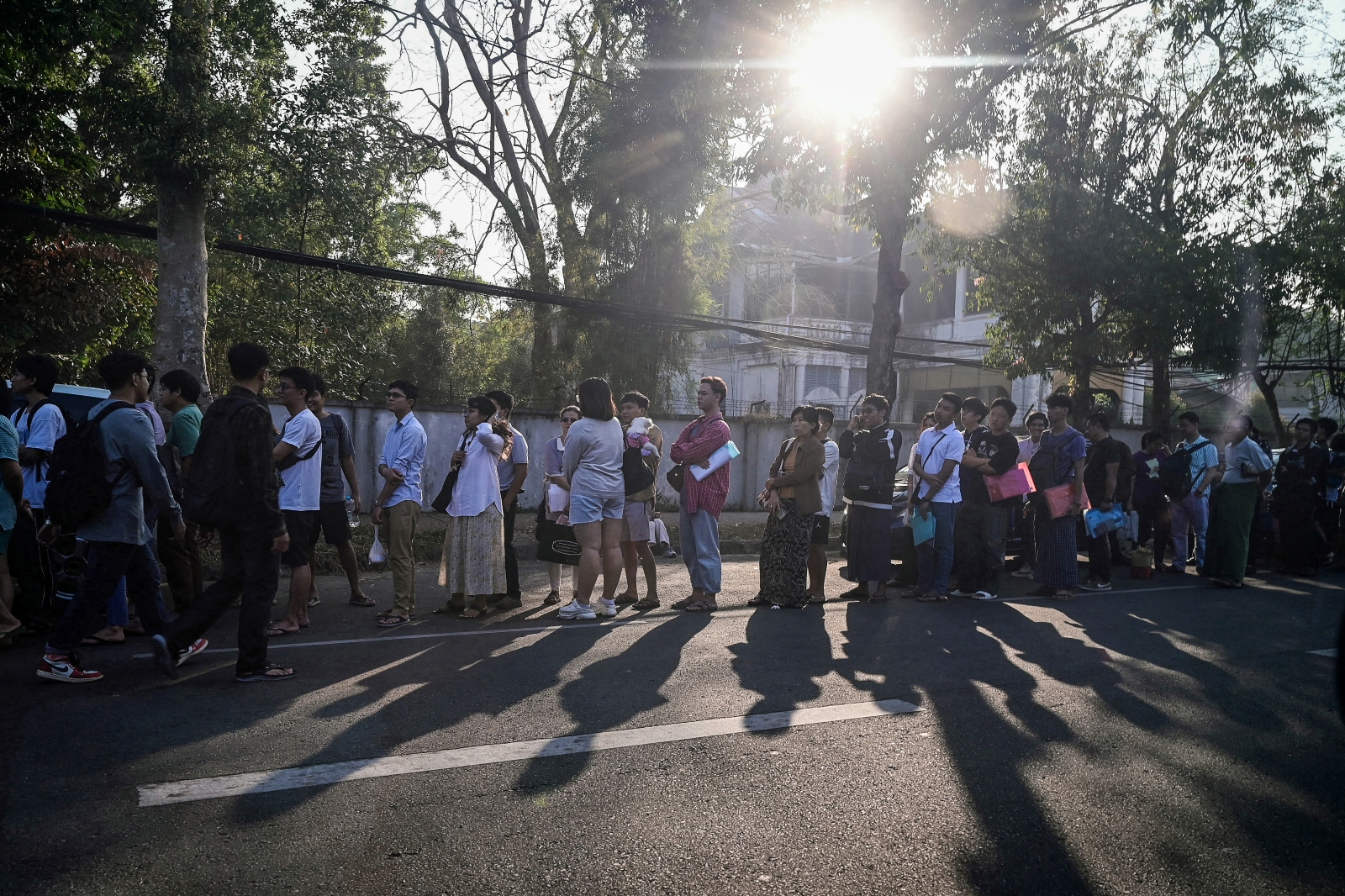Myanmar’s junta has announced a third six-month extension to its state of emergency, effectively delaying elections it had pledged to hold by August, justifying the move by citing instability caused by continued resistance attacks.
By AFP
In a speech made in Nay Pyi Taw on Wednesday, junta chief Senior General Min Aung Hlaing also acknowledged that more than a third of the country’s townships are not under full military control, in comments reported by state media on Wednesday.
The admission came on the second anniversary of the coup, as the military’s National Defence and Security Council agreed to prolong a state of emergency declared when the generals toppled Aung San Suu Kyi’s government.
The “state of emergency will be extended for another six months starting from February 1”, military-installed president Myint Swe was quoted as saying by state media.
Myanmar’s Constitution only allows for state of emergencies to be announced over two consecutive six-month periods in “normal” circumstances, suggesting Min Aung Hlaing is justifying the extension on exceptional grounds.
Extending the state of emergency pushes back the date by which elections must be held, according to the country’s constitution. As such, it appears that Min Aung Hlaing may deviate from the State Administration Council’s own roadmap, which had promised an election by August this year.
While Min Aung Hlaing reiterated a pledge to work towards nationwide elections, he made it clear the military would maintain its prominent role.
The military will always be the “guardian of the interests of the state and people… under whichever government comes,” he said, according to state broadcaster MRTV.
Deserted streets
The announcement came as streets emptied and shops closed across Myanmar in protest on the anniversary, with Western powers launching a fresh broadside of sanctions against the generals.
Streets in the commercial hub Yangon were largely deserted from late morning after activists called for people across the country to stay indoors. Main roads leading to the famous Shwedagon and Sule pagodas were largely deserted.
Around 200 supporters of the military marched through Yangon’s historic downtown in the early afternoon, while in Bangkok some 400 anti-junta protesters staged a noisy rally outside the Myanmar embassy.
The empty roads were in contrast to the huge protests seen in the weeks after the coup in 2021, which petered out in the face of a bloody crackdown by security forces.
In the Thai capital Bangkok, hundreds of Myanmar people gathered to protest the coup in front of the Myanmar embassy.
Min Aung Hlaing said that while the street demonstrations in major cities were gone, “violence is still here”, accusing anti-junta groups of hampering election plans.
Resistance groups have recently attacked and killed several people involved in carrying out a pre-election census for the military across the country, including in Yangon and Mandalay.
“Terrorists are terrorising, disturbing, killing and destroying,” he said, according to MRTV.

‘Unrest and violence’
Phil Robertson of Human Rights Watch said the extension shows “Min Aung Hlaing only cares about holding tight to power, and the rights and suffering of the Burmese people be damned.”
The military justified its February 1, 2021 power grab with unsubstantiated claims of widespread fraud in elections that Aung San Suu Kyi’s National League for Democracy won in a landslide.
The state of emergency was due to expire at the end of January and the military had been widely expected to announce on Wednesday that it would prepare for the polls.
The United States, Canada and the United Kingdom announced a new round of sanctions on the anniversary, targeting members of the junta and junta-backed entities – with the UK and Canada moving to sanction aviation fuel suppliers. The military, which is increasingly using airstrikes against its enemies, has recently hit a number of civilian targets including an elementary school and a music concert.
“The United States strongly opposes the Burma military regime’s decision to extend the state of emergency, prolonging the military’s illegitimate rule and the suffering it inflicts upon the country,” US State Department spokesman Ned Price said on Wednesday, using Myanmar’s former name.
Price said the United States was determined to work with other countries to “deny the regime international credibility.”
He also denounced the junta’s version of “so-called elections, which will exacerbate violence and instability and will not be representative of the country’s people.”
Australia also announced its first round of sanctions since the coup, sanctioning 16 SAC members and military conglomerates Myanma Economic Holdings Limited and Myanmar Economic Corporation.
More than 2,900 people have been killed in the military’s crackdown on dissent since it seized power and more than 18,000 have been arrested, according to monitoring group the Assistance Association of Political Prisoners.
The junta recently wrapped up a series of closed-court trials of Aung San Suu Kyi, 77, jailing its longtime enemy for a total of 33 years in a process rights groups have slammed as a sham.
“It is clear that the junta’s goal is for her to die in prison,” French lawyers Francois Zimeray and Jessica Finelle, who represent Suu Kyi, said in a statement.
“The main wish for 2023 is we want freedom and to go back home,” said Thet Naung, an activist in northern Sagaing Region, where the military and anti-coup fighters regularly clash.
“We have gone through many difficulties. We wanted to be happy and live freely but we lost everything. We have spent most of our time in jungles and stayed away from cities.”







